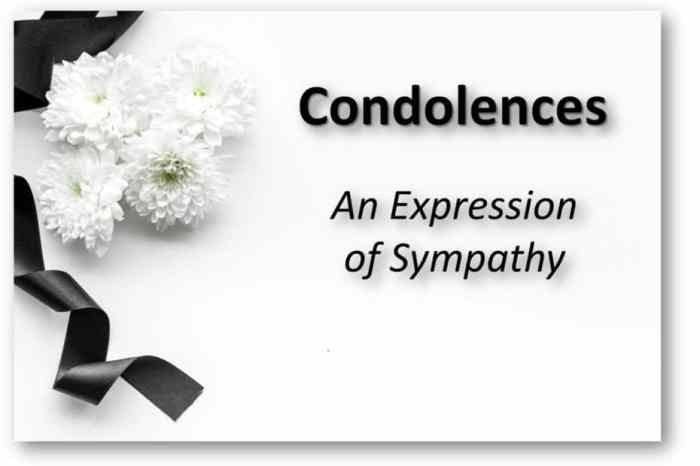When tragedy strikes in the business world, expressing sympathy and support becomes a crucial aspect of maintaining professional relationships and fostering a sense of community. Business condolence messages serve as a means to convey empathy, acknowledge loss, and offer comfort during difficult times.
Navigating the delicate balance between sincerity and professionalism in business condolence messages requires careful consideration of cultural norms, the type of loss, and the relationship with the deceased. This comprehensive guide delves into the intricacies of crafting meaningful condolence messages that resonate with recipients, providing practical advice and examples to help you express your genuine concern and support.
Sympathy and Condolence Messages for Business Associates
In the business world, maintaining strong professional relationships is crucial. When a business associate, client, or colleague experiences a loss, offering heartfelt sympathy and condolences is not only a kind gesture but also a reflection of your professionalism and empathy.
Crafting Sincere and Professional Messages
When expressing sympathy in a business setting, it’s important to strike a balance between sincerity and professionalism. Here are some guidelines to consider:
- Express Genuine Empathy: Begin your message by expressing your heartfelt condolences. Let your business associate know that you genuinely care about their loss and offer your support.
- Be Respectful of Their Privacy: While it’s appropriate to express your sympathy, avoid asking personal questions or delving into the details of the loss. Respect their privacy and allow them to share as much or as little as they feel comfortable with.
- Keep it Professional: While you want to convey your sincerity, it’s important to maintain a professional tone. Avoid using overly emotional or informal language. Keep your message concise, focused, and respectful.
- Offer Specific Support: If appropriate, offer specific support or assistance. This could include offering to help with practical tasks, providing emotional support, or connecting them with resources that can help them during this difficult time.
- Be Patient: Grief is a process, and it takes time to heal. Be patient with your business associate as they navigate their loss. Offer your support consistently and let them know that you’re there for them in the long run.
Cultural Considerations in Business Condolence Messages

Expressing condolences in a business setting requires sensitivity and cultural awareness. Different cultures have unique customs, language, and etiquette for conveying sympathy and support during times of grief. Understanding these variations helps ensure your messages are appropriate, respectful, and well-received.
Language and Tone
The language and tone of your condolence message should be formal, sincere, and respectful. Avoid using slang, colloquialisms, or overly casual language. Choose words that convey empathy, support, and understanding without being overly emotional or dramatic.
Customs and Etiquette
Cultural customs and etiquette surrounding condolences can vary significantly. In some cultures, it is customary to send a physical condolence card or letter, while in others, an email or phone call may be more appropriate. Research the specific customs of the recipient’s culture to ensure you follow the appropriate protocol.
Religious Beliefs
Be mindful of the religious beliefs of the recipient when crafting your condolence message. Some religions have specific rituals, prayers, or customs associated with mourning and bereavement. If you are aware of the recipient’s religious beliefs, consider incorporating appropriate elements into your message that show respect for their faith.
Examples of Culturally Sensitive Condolence Messages
- Western Cultures: “Please accept my heartfelt condolences during this difficult time. Your [relationship with the deceased] was a true inspiration, and their memory will continue to live on in the hearts of all who knew them.”
- Eastern Cultures: “May the blessings of peace and comfort surround you and your family during this time of sorrow. Your [relationship with the deceased] was a shining light in our lives, and their absence will be deeply felt.”
- Islamic Cultures: “Inna lillahi wa inna ilayhi raji’un (Verily we belong to Allah, and verily to Him do we return). May Allah grant you patience and strength during this trying time. Your [relationship with the deceased] was a pious soul, and their memory will be cherished forever.”
Formal and Informal Condolence Messages
When expressing condolences in a business context, it’s essential to consider the level of formality appropriate for the situation and relationship. Formal messages are suitable for professional relationships or situations requiring a more formal approach, while informal messages are appropriate for closer business associates or when a more personal touch is desired.
The table below compares formal and informal business condolence messages:
| Formal | Informal | |
|---|---|---|
| Tone | Respectful, sincere, and professional | Warm, personal, and heartfelt |
| Language | Professional and concise, avoiding colloquialisms and slang | More conversational and personal, allowing for expressions of personal connection and support |
| Appropriate Situations | When expressing condolences to a colleague, client, or business partner with whom you have a formal relationship | When expressing condolences to a close business associate or friend with whom you have a more personal relationship |
Formal Condolence Messages
Here are some examples of formal condolence messages suitable for professional relationships and situations requiring a more formal approach:
- “Please accept my sincere condolences on the passing of your [relationship to the deceased]. My thoughts are with you and your family during this difficult time.”
- “I was saddened to hear about the loss of your [relationship to the deceased]. [He/She] was a valued member of our team, and [his/her] contributions will be greatly missed. Please know that we are here to support you in any way we can.”
- “On behalf of the entire team, I would like to express our deepest sympathy for the loss of your [relationship to the deceased]. [He/She] was a respected colleague and friend, and we will miss [him/her] dearly. Our thoughts are with you and your family during this difficult time.”
Informal Condolence Messages
Here are some examples of informal condolence messages that are appropriate for closer business associates or when a more personal touch is desired:
- “I’m so sorry to hear about the loss of your [relationship to the deceased]. [He/She] was a wonderful person, and I will miss [him/her] dearly. My thoughts are with you and your family.”
- “I was heartbroken to hear about the passing of your [relationship to the deceased]. [He/She] was such a kind and compassionate person, and I will never forget the times we shared together. Please know that I am here for you if you need anything.”
- “I know how close you were to your [relationship to the deceased], and I can’t imagine how much you’re hurting right now. I want you to know that I’m here for you, no matter what. Please don’t hesitate to reach out if you need anything.”
Condolence Messages for Employees and Colleagues

Condolence messages for employees and colleagues should be sincere, respectful, and supportive. They should express sympathy for the loss and offer condolences to the family.
Importance of Creating a Supportive Work Environment
During times of grief, it’s important to create a supportive and empathetic work environment. This can include offering flexible work arrangements, providing counseling services, or simply being understanding and supportive.
Condolence Message Comparison Table
| Relationship | Appropriate Messages | Considerations ||—|—|—|| Coworker | “I am so sorry to hear about the loss of your loved one. My thoughts are with you and your family during this difficult time.” | Acknowledge the loss and express sympathy.
Offer support and condolences. || Supervisor | “I am deeply saddened to learn of the passing of your [relationship]. [He/She] was a valued member of our team and will be greatly missed. My thoughts are with you and your family during this difficult time.”
| Acknowledge the loss and express sympathy. Offer support and condolences. Highlight the positive impact of the deceased on the team. || Team Member | “I was shocked and saddened to hear about the loss of your [relationship]. [He/She] was a wonderful person and a valuable member of our team.
My thoughts are with you and your family during this difficult time.” | Acknowledge the loss and express sympathy. Offer support and condolences. Share fond memories of the deceased. |
Examples of Condolence Messages
* Loss of a Coworker: “I am so sorry to hear about the loss of your coworker. [He/She] was a great person and will be deeply missed. My thoughts are with you and your family during this difficult time.”
Loss of a Supervisor
“I am deeply saddened to learn of the passing of your supervisor. [He/She] was a great leader and mentor, and I learned a lot from him/her. My thoughts are with you and your family during this difficult time.”
Loss of a Team Member
“I was shocked and saddened to hear about the loss of your team member. [He/She] was a valuable asset to our team and will be greatly missed. My thoughts are with you and your family during this difficult time.”
Condolence Messages for Clients and Customers

Offering condolences to clients and customers during times of grief requires sensitivity, empathy, and professionalism. The goal is to express genuine support while maintaining appropriate boundaries and upholding the integrity of the business relationship.
Approaching Condolence Messages
When crafting condolence messages for clients and customers, consider the following guidelines:
- Professionalism: Maintain a professional tone, avoiding overly personal or emotional language.
- Empathy: Express genuine empathy and concern for the loss, acknowledging the emotional impact on the individual and their family.
- Personalization: If appropriate, personalize the message by mentioning the name of the deceased or referring to specific memories or interactions.
- Brevity: Keep the message concise and focused, avoiding lengthy expressions of sympathy.
- Appropriate Language: Use respectful and culturally sensitive language, avoiding religious or spiritual references unless you are certain they are appropriate.
Condolence Message Table
The following table provides examples of condolence messages for different scenarios:
| Relationship | Appropriate Messages | Considerations |
|---|---|---|
| Client who has lost a loved one | “We were deeply saddened to hear about the passing of your beloved [Name]. Our thoughts and heartfelt condolences are with you and your family during this difficult time.” | Express sympathy for the loss and acknowledge the emotional impact on the client and their family. |
| Customer who has lost a family member | “On behalf of our entire team, we extend our sincere condolences for the loss of your [Relationship]. We understand that this is a challenging time, and we want you to know that we are here to support you in any way we can.” | Offer support and let the customer know that the business is available to assist them during this difficult time. |
| Client or customer who has experienced a personal loss | “We were sorry to hear about your recent loss. Our thoughts are with you and your family during this challenging time. Please know that we are here to support you in any way we can.” | Express sympathy for the loss and offer support without assuming the nature of the loss. |
Maintaining Professional Boundaries
While it is important to express genuine empathy and support, it is also crucial to maintain professional boundaries with clients and customers. Avoid overly personal conversations or inquiries, and respect the individual’s privacy. The focus should be on offering condolences and support, rather than delving into personal details.
Closing Summary
In conclusion, business condolence messages are a powerful tool for expressing empathy, acknowledging loss, and offering support during challenging times. By understanding cultural variations, tailoring messages to the specific type of loss and relationship, and striking the right balance between sincerity and professionalism, you can create meaningful messages that resonate with recipients and strengthen business relationships.
FAQ Section
What is the primary purpose of a business condolence message?
The primary purpose of a business condolence message is to express sympathy, acknowledge the loss, and offer support to the bereaved individual or family during a difficult time.
How can I strike the right balance between sincerity and professionalism in a business condolence message?
To strike the right balance between sincerity and professionalism, focus on expressing genuine empathy, using appropriate language, and maintaining a respectful and formal tone.
What cultural considerations should I keep in mind when sending a business condolence message?
Be aware of cultural variations in expressing condolences, such as differences in language, customs, and etiquette. Research and understand the cultural background of the recipient to ensure your message is respectful and appropriate.
How can I tailor my condolence message to the specific type of loss?
Consider the nature of the loss and the relationship you had with the deceased. Tailor your message to reflect the unique circumstances and the impact of the loss on the bereaved individual or family.
